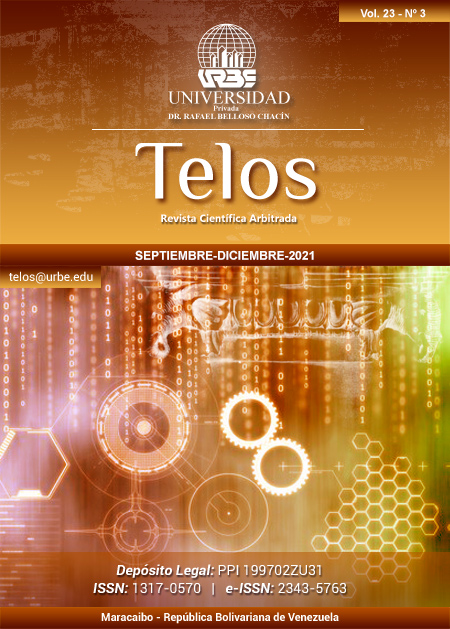Escuela Latinoamericana de Negocios (ELN): Una reflexión inicial
DOI:
https://doi.org/10.36390/telos233.10Resumen
Enough. Is it time for the constitution of a Latin American School of Business Taught? To found it. To have our position. What contributions has Latin America made theoretically and empirically in Business, in the academic literature of Creativity, Management, Innovation, Entrepreneurship, Family Business, Business History, and other related disciplines? Where are we positioned in the history of global research and academic debates?
Descargas
Referencias
Aguinis, Herman; Villamor, Isabel; Lazzarini, Sergio; Vassolo, Roberto; Amorós, José; and Allen, David (2020). Conducting Management Research in Latin America: Why and What’s In It for You? Journal of Management, 46(5), United States, (Pp. 615–636). https://doi.org/10.1177/0149206320901581
Cacciatore, Guiseppe (2004). Una filosofía para América Latina: Leopoldo Zea. Telos. Revista de Estudios Interdisciplinarios en Ciencias Sociales, 6(1), Venezuela, (Pp. 9-24). http://ojs.urbe.edu/index.php/telos/article/view/1160
Cancino, Christian, Merigó, José, Urbano David and Amorós José (2020). Evolution of the entrepreneurship and innovation research in Ibero-America between 1986 and 2015, Journal of Small Business Management, (in press) United Kingdom, https://www.tandfonline.com/doi/full/10.1080/00472778.2020.1776578
Csikszentmihályi, Mihaly (1990). Flow: the psychology of optimal experience. Harper & Row, United States.
De Bono, Edward (1985). Six Thinking Hats: An Essential Approach to Business Management. Little, Brown, & Company, United States.
De Lissovoy, Noah (2015). Epistemology of Emancipation. In De Lissovoy Noah, Education and Emancipation in the Neoliberal Era. (Pp. 131-146). Palgrave Macmillan, United States.
Del Valle, María del Carmen; Jasso, Javier and Núñez, Ismael. (2016). Ciencia, tecnología, innovación y desarrollo. El pensamiento latinoamericano, FCE, UNAM, España.
Etzkowitz, Henry and Leydesdorff, Loet (1995). The Triple Helix of university-industry-government relations: a laboratory for knowledge-based economic development, EASST Review, 14(1), Holland, (Pp. 11-19). https://papers.ssrn.com/sol3/papers.cfm?abstract_id=2480085
Freire, Paulo (1985). Pedagogía del oprimido. Siglo XXI Editores, México.
Guerrero, Maribel (2021). The role of incubators and accelerators in the Latin American entrepreneurship and innovation ecosystems. In Sarfraz A. Mian, Magnus Klofsten & Wadid Lamine (Eds.), Handbook of Research on Business and Technology Incubation and Acceleration, A Global Perspective, (Pp. 335-350), Edward Elgar, Cheltenham, UK. https://www.e-elgar.com/shop/usd/handbook-of-research-on-business-and-technology-incubation-and-acceleration-9781788974776.html
Held, David (1980). Introduction to Critical Theory: Horkheimer to Habermas. University of California Press, United States.
Horkheimer, Max (1976). Traditional and Critical Theory, in Paul Connerton (ed.). Critical Sociology: Selected Readings, Penguin, United Kingdom.
Jasso, Javier; Del Valle, María del Carmen and Núñez, Ismael (2017). Innovation and development: a revision of the Latin American thought, Academia Revista Latinoamericana de Administración, 30 (4), United Kingdom, (Pp. 444-458). https://doi.org/10.1108/ARLA-09-2016-0249
Lincoln, Yvonna and González y González, Elsa (2008). The search for emerging decolonizing methodologies in qualitative research: Further strategies for liberatory and democratic inquiry. Qualitative Inquiry, 14(5), United States, (Pp. 784-805). https://doi.org/10.1177%2F1077800408318304
Lorde, Audre (1984). The master’s tools will never dismantle the master’s house. Sister outsider: Essays and speeches, Crossing Press, United States.
Lu, Ren; Lu, Qu; Lv, Daguo; Huang, Yuxiang; Li, Shuping; Jian, Ze and Reve, Torger. (2020). The evolution process of entrepreneurship studies in the 21st century: research insights from top business and economics journals. Journal of Economic Surveys, 34(4), United States (Pp.922-951). https://doi.org/10.1111/joes.12365
Maslow, Abraham (1994). La personalidad creadora, Kairos, España.
Mignolo, Walter (2009). Epistemic disobedience, independent thought, and decolonial freedom. Theory, culture & society, 26(7-8), United States, (Pp. 159-181). DOI https://doi.org/10.1177/0263276409349275
Mothe, Caroline and Nguyen, Thuc (2010). The link between non-technological innovations and technological innovation, European Journal of Innovation Management, 3(3), United Kingdom, (Pp. 313-332). https://doi.org/10.1108/14601061011060148
Prebisch, Raúl. (1949). El desarrollo económico de la América Latina y algunos de sus principales problemas, E/CN.12/89, CEPAL, Chile.
Ribot, Théodule (1901). Ensayo sobre la imaginación creadora. Librería de Victoriano Suárez, Librería de Fernando Fe, España.
Ruiz-Martínez, Rocío; Kuschel, Katherina and Pastor, Inmaculada (2021). A contextual approach to women's entrepreneurship in Latin America: impacting research and public policy. International Journal of Globalisation and Small Business, 12(1), Switzerland, (Pp. 83-103). http://www.inderscience.com/offer.php?id=113835
Sábato, Jorge. (1971). Ciencia, Tecnología, Desarrollo y Dependencia, San Martín de Tucumán, Serie: Mensaje. Argentina.
Shalley, Christina; Hitt, Michael and Zhou, Jing. (Eds.). (2015). The Oxford handbook of creativity, innovation, and entrepreneurship. Oxford University Press, Oxford, UK. https://doi.org/10.1093/oxfordhb/9780199927678.001.0001
Smith, Linda (2012). Decolonizing methodologies: Research and indigenous peoples. Zed Books, United Kingdom.
Soto, Gabriela and Gómez, Pablo. (2018) Introduction, History and Technology, 34(1), United Kingdom, (Pp. 5-10), https://doi.org/10.1080/07341512.2018.1516848
Villagrán, Carlos (1991). Creatividad e investigación sobre la comunicación. Revista Mexicana de Ciencias Políticas y Sociales, 36(144), México (Pp. 27-38). DOI: https://doi.org/10.22201/fcpys.2448492xe.1991.144.51889
Welter, Friederike and Gartner, William (2016). A Research Agenda for Entrepreneurship and Context. Edward Elgar, Cheltenham, United Kingdom.




